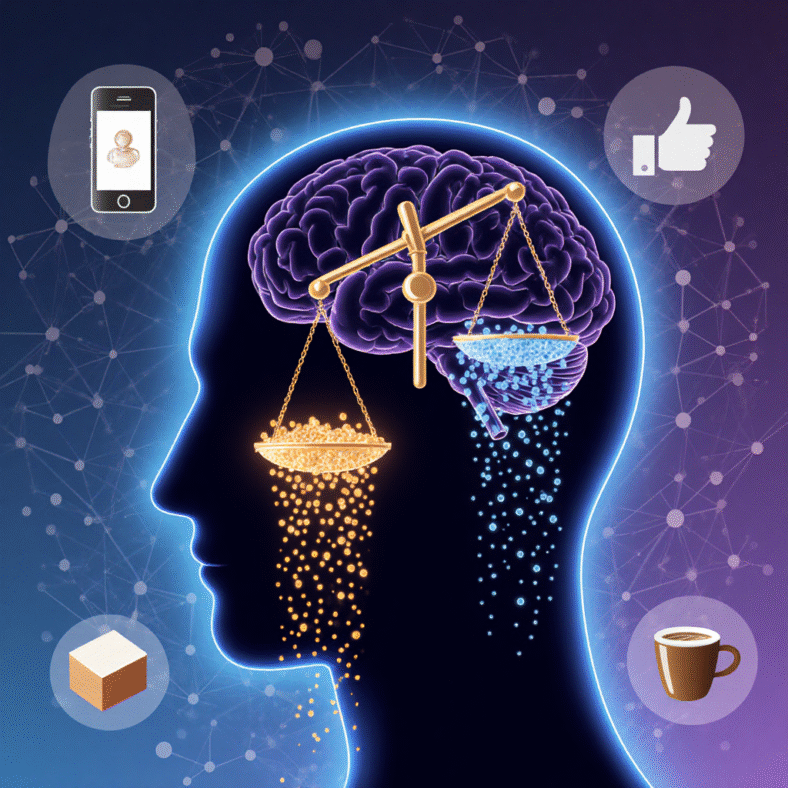1. Dopamine Is Necessary For Survival
In a study with rodents that were genetically altered to not produce dopamine, food was placed a body length away and yet those rodents died of starvation. This shows that dopamine is crucial for motivation and the drive to seek rewards.
2. The Pleasure-Pain Balance: Why We’re All Vulnerable to Addiction
The most groundbreaking concept Dr. Lemke explains is that pleasure and pain are processed in the same parts of the brain and work like opposite sides of a balance. When you experience pleasure (from alcohol, sugar, social media, etc.), your brain compensates by tilting an equal and opposite amount past neutral toward pain. This is why we get hangovers, comedowns, and cravings.
The crucial insight: our brains overshoot when compensating. They don’t just return to neutral; they tip to the pain side, creating a deficit. This mechanism evolved to keep us seeking more in a world of scarcity, but in our world of abundance, it makes us vulnerable to addiction.
You might not be addicted to drugs, alcohol, gambling or porn, but how about TikTok? Every seemingly harmless video triggers a very real release of dopamine.
3. Childhood and Genetic Risk: 50-60% of Addiction is Inherited
If you have a biological parent or grandparent with addiction, you are significantly more likely to develop that addiction. The genetic risk accounts for about 50-60% of addiction vulnerability. This isn’t deterministic, but it means some people must be more vigilant.
4. Modern Life has Made Us Soft and Less Capable of Dealing with Stressors
Generally speaking, modern life is one of abundance, safety, comfort and convenience. And because we’re exposed to constant pleasure and insulated from pain, we’ve collectively reset our reward pathways to the side of pain. This means:
- We need more pleasure to feel any pleasure at all
- The slightest pain feels excruciating
- We lack “mental calluses” to tolerate discomfort
5. The Rat Experiment That Reveals Stress → Addiction
Rats easily get addicted to cocaine. When the drug is removed, they eventually stop pressing the dispenser lever. But if exposed to a painful foot shock (stress), they immediately run back to press the lever. This reveals that once your brain discovers a drug (or activity) that releases dopamine, stress will always make you crave it again.
Do you find yourself reaching for a cookie or watching just one more quick video instead of facing that difficult decision, or starting that challenging task?
6. Your Personal Narrative Determines Your Future
How you tell your life story isn’t trivial; it’s a roadmap for your future. People who narrate their lives as constant victims will literally create more victimhood going forward. In recovery, people shift from “everyone else’s fault” narratives to taking personal responsibility.
Yes, you’re a normal human being with ancient instincts that are out of place in a modern world, but that doesn’t mean you’re powerless puppet of circumstances.
So What Can You Do?
You’ve already taken the first and most important step of recognizing that some of your actions and habits may be driven by dopamine-seeking. That recognition gives you mental space to choose alternate actions and disrupt old behavior patterns. Most people know when they’re doing something that’s not really good for themselves, and changing those behaviors isn’t about just about “willpower”. You can harness the very human tendency to enjoy dopamine hits by redirecting *how* you get those hits.
- Recognize the power of motivation: Dopamine isn’t just about pleasure—it’s essential for driving effort and action. Your brain doesn’t care what you do to stimulate the dopamine, so you can choose to replace unhealthy habits with healthy ones, and celebrate the process and results.
- Break big tasks into small, achievable steps: Completing even a simple step can generate the dopamine needed to keep going.
- Celebrate small wins: Reward yourself for progress, however minor. The feeling of achievement can help sustain motivation for bigger goals.
- Create cues and routines: Design your environment to make positive actions easier to start. Visual reminders, checklists, and scheduled times can prime your brain for action.
- Stay physically active: Exercise is a proven way to boost dopamine levels and overall motivation.
- Prioritize sleep, nutrition, and connection: Healthy habits support the chemistry your brain uses for motivation. Social interaction and good nutrition matter, too.
- If motivation is consistently low: Consider talking to a healthcare professional. Chronic lack of motivation might be a sign of dopamine imbalance or other issues that can be treated.
References:
This summary is based on the podcast episode from The Diary Of A CEO with Steven Bartlett, featuring Dr. Anna Lemke discussing dopamine, addiction, and brain health. Listen to the full episode.
Feeding behavior in dopamine-deficient mice – PMC (https://pmc.ncbi.nlm.nih.gov/articles/PMC18425)


Leave a Reply
You must be logged in to post a comment.